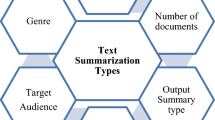Abstract
Text summarization aims at getting the most important content in a condensed form from a given document while retains the semantic information of the text to a large extent. It is considered to be an effective way of tackling information overload. There exist lots of text summarization approaches which are based on Latent Semantic Analysis (LSA). However, none of the previous methods consider the term description of the topic. In this paper, we propose a comprehensive LSA-based text summarization algorithm that combines term description with sentence description for each topic. We also put forward a new way to create the term by sentence matrix. The effectiveness of our method is proved by experimental results. On the summarization performance, our approach obtains higher ROUGE scores than several well known methods.
Access this chapter
Tax calculation will be finalised at checkout
Purchases are for personal use only
Preview
Unable to display preview. Download preview PDF.
Similar content being viewed by others
References
Radev, D.R., Hovy, E., McKeown, K.: Introduction to the special issue on summarization. Computational Linguistics-Summarization 28(4), 399–408 (2002)
Vodolazova, T.: The role of statistical and semantic features in single-document extractive summarization. Artificial Intelligence Research 2(3), 35–44 (2013)
Gupta, V., Lehal, G.S.: A survey of Text Summarization Extractive Techniques. Journal of Emerging Technologies in Web Intelligence 2(3) (2010)
Das, D., Martins, A.: A Survey on Automatic Text Summarization. In: Literature Survey for the Language and Statistics II Course at CMU (2007)
Deerwester, S.C., Dumais, S.T., Landauer, T.K., Furnas, G.W., Harshman, R.A.: Indexing by latent semantic analysis. Journal of the American Society for Information Science and Technology, 391–407 (1990)
Gong, Y.H., Liu, X.: Generic text summarization using relevance measure and latent semantic analysis. In: Proceedings of the 24th Annual International ACM SIGIR Conference on Research and Development in Information Retrieval, pp. 19–25. ACM, New York (2002)
Steinberger, J., Ježek, K.: Text Summarization and Singular Value Decomposition. In: Yakhno, T. (ed.) ADVIS 2004. LNCS, vol. 3261, pp. 245–254. Springer, Heidelberg (2004)
Murray, S.: Renals, and J. Carletta. Extractive Summarization of Meeting Recordings. In: Proceedings of the 9th European Conference on Speech Communication and Technology, pp. 593–596 (2005)
Ozsoy, M.G., Clicekli, I., Alpaslan, F.N.: Text summarization of Turkish Texts using Latent semantic analysis. In: Proceedings of the 23rd International Conference on Computational Linguistics (Coling 2010), Beijing, pp. 869–876 (2010)
Ai, D., Zheng, Y., Zhang, D.: Automatic text summarization based on latent semantic indexing. Artif. Life Robotics 15, 25–29 (2010)
Berry, M.W., Dumais, S.T., O’Brien, G.W.: Using linear algebra for intelligent information retrieval. SIAM Review 37(4), 575–595 (1995)
Lin, C.Y.: Rouge: a package for automatic evaluation of summaries. In: Proceedings of the ACL Text Summarization Workshop, pp. 74–81 (2004)
He, Z., Chen, C., Bu, J., Wang, C., Zhang, L.: Document Summarization Based on Data Reconstruction. In: Proceeding of the Twenty-Sixth AAAI Conference on Artificial Intelligence, pp. 620–626 (2012)
Chandra, M., Gupta, V., Paul, S.K.: A statistical approach for Automatic Text Summarization by Extraction. In: 2011 International Conference on Communication Systems and Network Technologies, pp. 268–271 (2011)
Alguliev, R.M., Aliguliyev, R.M., Hajirahimova, M.S., Mehdiyev, C.A.: MCMR: Maximum coverage and minimum redundant text summarization model. Expert Systems with Applications 38(12), 514–522 (2011)
Author information
Authors and Affiliations
Editor information
Editors and Affiliations
Rights and permissions
Copyright information
© 2013 Springer-Verlag Berlin Heidelberg
About this paper
Cite this paper
Wang, Y., Ma, J. (2013). A Comprehensive Method for Text Summarization Based on Latent Semantic Analysis. In: Zhou, G., Li, J., Zhao, D., Feng, Y. (eds) Natural Language Processing and Chinese Computing. NLPCC 2013. Communications in Computer and Information Science, vol 400. Springer, Berlin, Heidelberg. https://doi.org/10.1007/978-3-642-41644-6_38
Download citation
DOI: https://doi.org/10.1007/978-3-642-41644-6_38
Publisher Name: Springer, Berlin, Heidelberg
Print ISBN: 978-3-642-41643-9
Online ISBN: 978-3-642-41644-6
eBook Packages: Computer ScienceComputer Science (R0)




